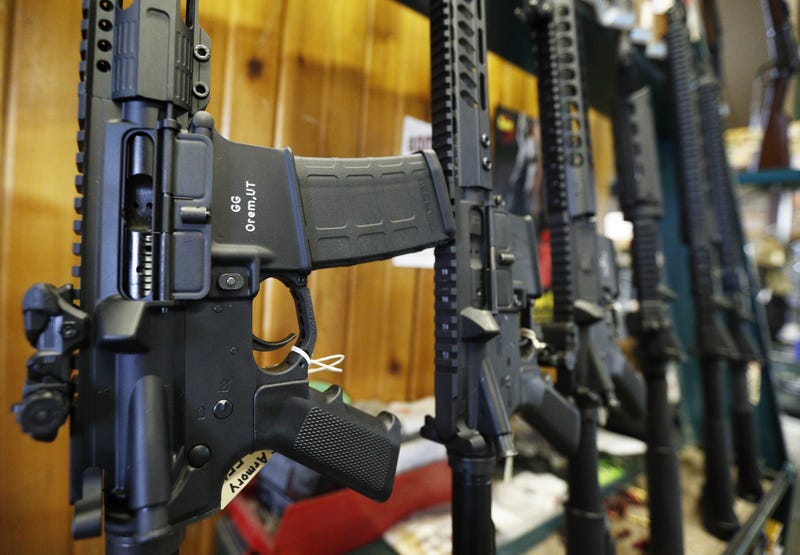
Buffalo, N.Y. (WBEN) - The United States has been rocked by a pair of mass shootings over the course of the last week-and-a-half.

First, it was on May 14 when an 18-year-old traveled more than three hours to a Tops Friendly Market on Jefferson Avenue in Buffalo, New York to carry out a racially motivated shooting that killed 10 Black people.
Then it was just Tuesday when another 18-year-old went to an elementary school in Uvalde, Texas and killed 19 children and two teachers.
In both instances, the gunmen carried out these heinous acts of violence with the help of an AR-15 style semi-automatic assault rifle.
With two jarring mass shootings in less than a two-week span, it has, once again, brought up the discussions of gun laws and whether or not to be more strict with gun laws.
New York Gov. Kathy Hochul proposed raising the age for purchasing the type of firearms used in the recent mass shootings from 18 to 21-years-old.
“Just this morning, as we’re all reeling with the pain, I’m asking myself as governor: 'Am I supposed to just leave all the flags at half-mast? They’re still at half-mast from Buffalo,'” said Hochul during a press conference.
Only six states - California, Florida, Hawaii, Illinois, Vermont and Washington - require buyers to be at least 21 instead of 18 to purchase rifles or shotguns, according to the Giffords Law Center to Prevent Gun Violence. Those states have the same higher age limit for handguns, while a few other states have no age limits at all for any firearm, the gun-control advocacy group says.
At the national level, Senate Majority Leader Chuck Schumer swiftly set in motion a pair of background-check bills for gun buyers on Wednesday in response to Tuesday's mass shooting in Texas. However, Schumer acknowledged Congress' unyielding rejection of previous legislation to curb the national epidemic of gun violence.
Schumer implored his Republican colleagues to cast aside the powerful gun lobby and reach across the aisle for even a modest compromise bill. But no votes are being scheduled.
While the debate continues about gun restrictions and other laws in local and federal government, there are some that believe the issues at hand can be dealt with in a way that's not punishing law-abiding citizens and good people in the country. However, the problems at hand need to be looked at entirely different.
"They are not fixing the problem. They're putting a band-aid on a bullet wound. They're not looking at the problem where the problem lies," said retired Buffalo Police Officer and firearms instructor Chris Kessler. "Nobody's held responsible for their bad behavior. They're given excuses. Both these kids here, they threatened students around them, their counselors annotated their problem, but yet they're still right back in the classrooms. They alienate themselves, and then are alienated from the people around them, and they're not held responsible for their bad behavior. That's what the problem comes down to."
Kessler worked 29 years on the force as a Buffalo Police Officer, spending his entire career on the East Side of Buffalo. He knows that with police work, one is out in the community to help serve the good people need help, and put the bad guys in jail.
"Nobody deserves to be a victim. I don't care what your social class is, what are economic class is, where you live, anything. Nobody deserves to be picked on, belittled or violated in any way," Kessler said. "And nobody deserves to be hated. The only ones that do that are the bad guys, and that's what this line of work is about. It's about being on that line right there between the good and the bad, and there's far more good people than there are bad."
Kessler acknowledges there are times where certain weapons or attachments to weapons are unnecessary, however, he believes that not all weapons or users of those weapons should have certain restrictions. It is about finding ways to make sure guns do not find the hands of individuals who should not possess these types of deadly weapons.
It is Kessler's belief that a lot of gun violence problems in the country today comes down to a huge mental health crisis disguised as gun violence.
"These two kids both had a history of behavior that should have been looked at and scrutinized a little better," Kessler said. "Should every 18-year-old kid be held at fault because of what these two kids did in the last week-and-a-half? I don't think so... Why should they be held liable for what these two kids with huge mental health crisis problems [did?]"
While local authorities often get involved when there is some sign of trouble, there's a point where there's nothing they can do other than give a referral. At that point, it's then up to the parents, the community, the judges, or somebody else to take responsibility to push the issues a little further.
In addition, especially when background checks are being done on anyone purchasing a weapon, there is no way to indicate whether or not that individual is dealing with any kind of mental ailment. Nothing has been annotated in one's record, as NICS checks only look over someone's criminal history.
"Maybe a little of their mental history - maybe it has to be designated into phases or types of mental ailments that you have that you could be red-flagged on and maybe it's kept on file with the state police or some authority within the NICS check - where if you've got a mental ailment, it's annotated and you're red-flagged," Kessler said. "But you've got all this HIPAA stuff that's out there right now, and doctor-patient confidentiality, and that's where the problem lies. When you go to a counselor and a counselor [says] this guy's got some sort of mental deficiency, or this person has an exasperated violent personality, it's between the physician and the patient right there. Nobody else knows about it."
Shortly after Tuesday's shooting in Uvalde, President Joe Biden called for "common sense" gun reforms that may not prevent every tragedy from happening, but certain ones would have a significant impact and have no negative impact on the second amendment. The President believes that some of the actions taken in the past can happen again, and it would save more lives.
Kessler says it's not a political matter when it comes to "common sense", but there's a big portion of normality in one's life that runs within social norms that are accepted by everybody. However, he says it's the destructive behaviors that do not fit the context of social norms that need to be watched and annotated.
"There needs to be a place where that stuff is annotated, so when somebody does go to get a firearm - whether it's a pistol, rifle, running down to Walmart to grab a shotgun - it's annotated that maybe you don't fit within the social norms. Therefore, you shouldn't be allowed to have a weapon. There needs to be something there," Kessler said.
"There's a huge mental problem in the United States right now, and it's not being worked on. With the red flag laws, when they tried to pass them before, a lot of the problem with getting any of that pushed through is because it was all wrong. They wanted to penalize everybody for a bad day, instead of just inoculating the people that shouldn't be around this stuff. They shouldn't be allowed to own a firearm, they shouldn't be allowed to purchase a firearm, and it shouldn't be annotated somewhere. But you'd have doctors and people and counselors and psychiatrists that says it violates patient-doctor confidentiality by letting the state know that this person should not be around firearms because of their mental status."
As for other "common sense" issues that need addressing, Kessler says some people need to be held responsible from the onset and not coddled.
"When there is an issue, they need to quit blaming the issue on something other than where that issue is, and they need to identify where it came from," he said. "Bad parenting, absentee parents, single parent households, that's the start with some of these. Some of these kids are just coddled so long that their parents really don't take an active part in their life, and it starts at a younger age. Some of these kids need counseling, and they're not given counseling, and things spiraled out of control."
One of the biggest problems for Kessler lies in a lot of the bail reforms in place.
"Some people aren't gonna agree with me on this, and the people that don't agree with me are people that have never been involved in law enforcement or the judicial system - gun offenses normally get thrown out in a plea deal. I've had it happen before," Kessler said. "I've had it happen multiple times where I've arrested, other cops that I know have arrested people, it's the second, third, fourth time they've been arrested with a gun. But seeing they've never been convicted of a gun charge, it doesn't appear on [their record], so they're back out there, because it is no bail. They're out there with their bad behavior, right back to what they were doing, because they're not held responsible."
So how can this issue potentially be resolved?
Kessler brought up a couple of different federal programs that were designed to take bad guys that were previously convicted felons, that were caught a second time with a firearm, and send them out of state. He says the programs in place were working not just nationally, but also in Erie County and the City of Buffalo.
"Within one year, after the conviction started, we'd see a decrease in shootings, homicides would go down, and we'd have a whole lot less bad guys carrying guns," Kessler explained. "They didn't want to go to New Mexico getting caught with a gun. Their friends, they wouldn't have any friends in jail, where here, you go to jail for six months and half of your buddies from the neighborhood are in jail. They don't care. But when you're sending them off to New Mexico, Arizona and Utah, their girlfriends aren't coming to visit, their parents, their brothers or sisters or friends are coming to visit with them, and they're gone for five years. So we had see a downtick in the amount of gun arrest, along with the amount of shootings, the amount of robberies with guns, the amount of homicides, they always went down. And those programs were always tossed on out because of the confines of the demographics that were being arrested.
As for the possible solution of raising the age restriction for people to purchase guns, Kessler believes it's the equivalent of trying to put a band-aid on a bullet wound, the problem is not being fixed.
"I think it's a parental thing between the 18 and 21 [age group]. The kids are still living at home, but they're 18-years-old. They can vote, they can join the military, they should be able to go out and buy a pistol or apply for their pistol permit, get a rifle, get a shotgun, whatever. They should be able to do that. They shouldn't be held responsible for the bad actions of a few."
Hear more of our conversation with Kessler in the player below:





